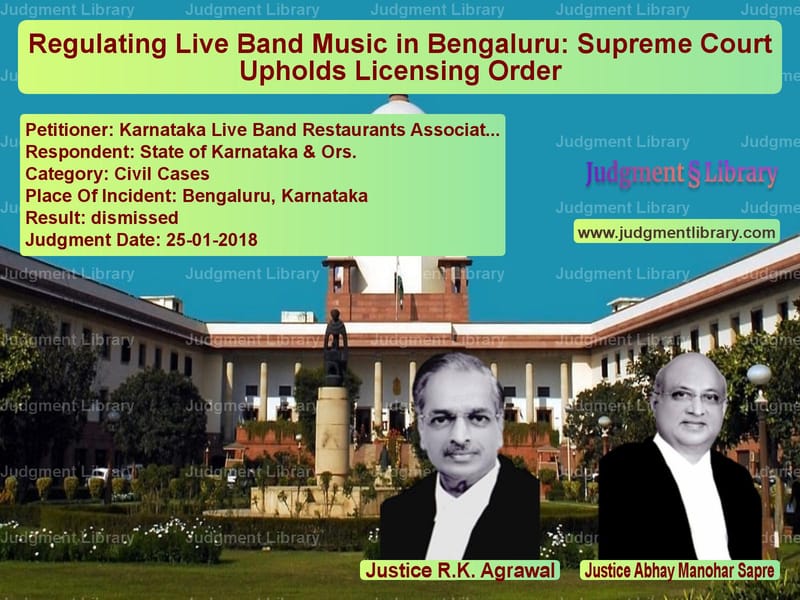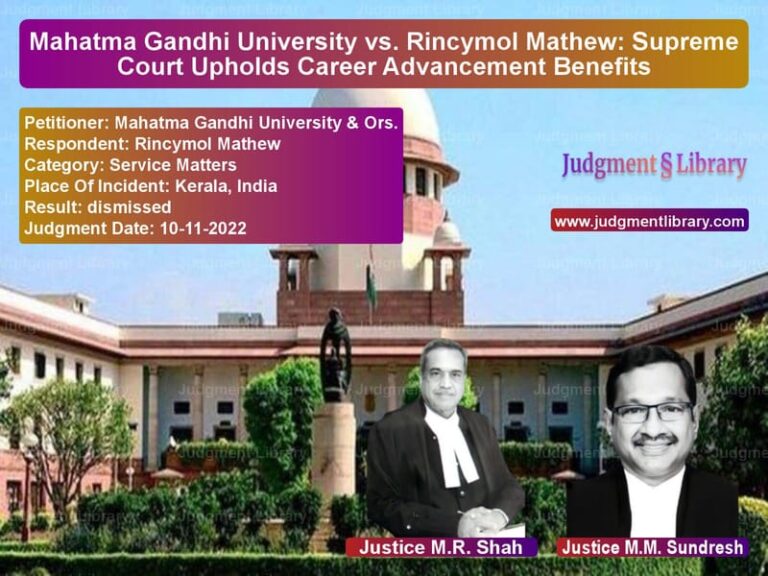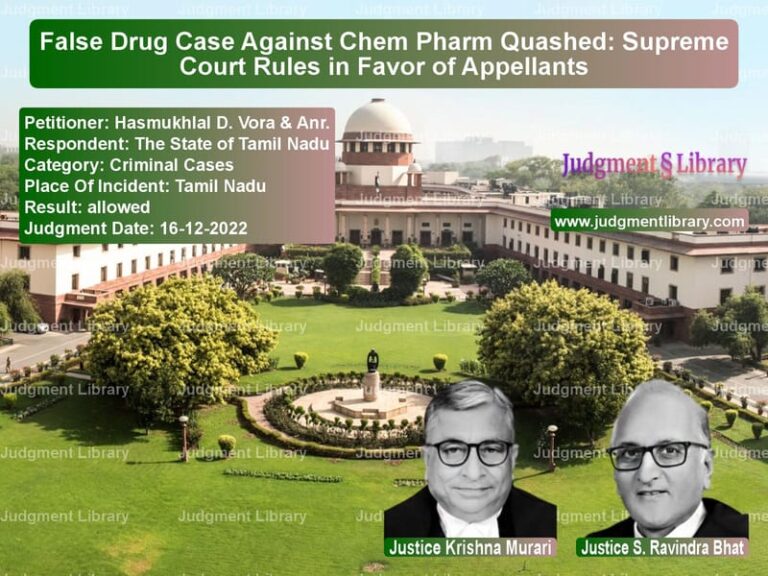Regulating Live Band Music in Bengaluru: Supreme Court Upholds Licensing Order
The Supreme Court of India, in its judgment dated January 25, 2018, upheld the constitutional validity of the Licensing and Controlling of Places of Public Entertainment (Bangalore City) Order, 2005. The ruling came in response to an appeal by the Karnataka Live Band Restaurants Association, which challenged the licensing requirements imposed by the Commissioner of Police, Bengaluru. The Court examined the balance between individual business rights and public safety, ultimately affirming the regulatory framework.
Background of the Case
The case arose from a long-standing dispute over live band performances in Bengaluru’s restaurants. The Karnataka Live Band Restaurants Association, representing restaurant owners, opposed regulations introduced under the Karnataka Police Act, 1963. Initially, in 1989, the Commissioner of Police had issued an order requiring restaurants providing live entertainment to obtain licenses. After a legal battle that reached the Supreme Court in 2002, the Court ruled that restaurants with live band performances were places of ‘Public Entertainment’ and not ‘Public Amusement’ under the Act, making the 1989 order inapplicable.
Following this ruling, in 2005, the Commissioner of Police issued a fresh licensing order, which brought live bands, cabaret dances, and discotheques under strict regulatory control. The restaurant owners challenged this order in the Karnataka High Court, arguing that it was unconstitutional. The High Court dismissed their challenge, prompting an appeal to the Supreme Court.
Arguments by the Petitioners
The petitioners contended that:
- The Order 2005 violated Article 14 of the Constitution as it was discriminatory.
- The licensing requirements infringed their fundamental right to conduct business under Article 19(1)(g).
- The conditions imposed under the order were unreasonably restrictive and impossible to comply with.
- The law treated restaurants with live band performances differently from other entertainment venues without a valid justification.
Arguments by the Respondents
The State of Karnataka defended the order, arguing that:
- The licensing regulations were necessary to ensure public safety and prevent illegal activities such as gambling, prostitution, and drug abuse.
- Regulating establishments that offered live performances was within the powers of the Commissioner under Section 31 of the Karnataka Police Act.
- The rules were designed to prevent obscenity and indecency in entertainment venues.
- The conditions imposed in the order were reasonable and aimed at maintaining law and order.
Observations of the Supreme Court
The Supreme Court examined the legality of the licensing order in the context of Articles 14 and 19(1)(g). It made the following key observations:
- “Salus Populi Supremo Lex” (the safety of the people is the supreme law) and “Salus Republicae Supremo Lex” (the safety of the state is the supreme law) must be prioritized over individual business interests.
- Licensing regulations are reasonable restrictions under Article 19(6) and do not violate fundamental rights.
- Live band performances and cabaret dances in restaurants fall within the definition of ‘Public Entertainment’ and can be regulated by the Commissioner under Section 31 of the Karnataka Police Act.
- The order ensures public morality and safety, preventing illegal and indecent activities in restaurants.
- Requiring licenses does not amount to discrimination under Article 14 as it applies to all establishments engaged in similar activities.
Final Verdict
The Supreme Court dismissed the appeal, upholding the validity of the Licensing Order 2005. It ruled that the licensing framework was essential for maintaining public order and preventing misuse of entertainment venues. The Court directed the Commissioner to ensure compliance with licensing conditions and take strict action against violators.
Conclusion
The judgment underscores the importance of regulatory oversight in entertainment venues while balancing business rights and public welfare. By affirming the constitutionality of the licensing order, the Supreme Court has reinforced the need for responsible entertainment practices in public spaces.
Don’t miss out on the full details! Download the complete judgment in PDF format below and gain valuable insights instantly!
Download Judgment: Karnataka Live Band vs State of Karnataka & Supreme Court of India Judgment Dated 25-01-2018.pdf
Direct Downlaod Judgment: Direct downlaod this Judgment
See all petitions in Public Interest Litigation
See all petitions in Fundamental Rights
See all petitions in Legislative Powers
See all petitions in Judgment by R K Agrawal
See all petitions in Judgment by Abhay Manohar Sapre
See all petitions in dismissed
See all petitions in supreme court of India judgments January 2018
See all petitions in 2018 judgments
See all posts in Civil Cases Category
See all allowed petitions in Civil Cases Category
See all Dismissed petitions in Civil Cases Category
See all partially allowed petitions in Civil Cases Category







